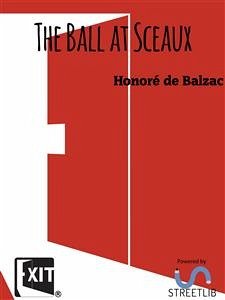THE BALL AT SCEAUX
The Comte de Fontaine, head of one of the oldest families in Poitou, had served the Bourbon cause with intelligence and bravery during the war in La Vendee against the Republic. After having escaped all the dangers which threatened the royalist leaders during this stormy period of modern history, he was wont to say in jest, "I am one of the men who gave themselves to be killed on the steps of the throne." And the pleasantry had some truth in it, as spoken by a man left for dead at the bloody battle of Les Quatre Chemins. Though ruined by confiscation, the staunch Vendeen steadily refused the lucrative posts offered to him by the Emperor Napoleon. Immovable in his aristocratic faith, he had blindly obeyed its precepts when he thought it fitting to choose a companion for life. In spite of the blandishments of a rich but revolutionary parvenu, who valued the alliance at a high figure, he married Mademoiselle de Kergarouet, without a fortune, but belonging to one of the oldest families in Brittany.
When the second revolution burst on Monsieur de Fontaine he was encumbered with a large family. Though it was no part of the noble gentlemen's views to solicit favors, he yielded to his wife's wish, left his country estate, of which the income barely sufficed to maintain his children, and came to Paris. Saddened by seeing the greediness of his former comrades in the rush for places and dignities under the new Constitution, he was about to return to his property when he received a ministerial despatch, in which a well-known magnate announced to him his nomination as marechal de camp, or brigadier-general, under a rule which allowed the officers of the Catholic armies to count the twenty submerged years of Louis XVIII.'s reign as years of service. Some days later he further received, without any solicitation, ex officio, the crosses of the Legion of Honor and of Saint-Louis.
The Comte de Fontaine, head of one of the oldest families in Poitou, had served the Bourbon cause with intelligence and bravery during the war in La Vendee against the Republic. After having escaped all the dangers which threatened the royalist leaders during this stormy period of modern history, he was wont to say in jest, "I am one of the men who gave themselves to be killed on the steps of the throne." And the pleasantry had some truth in it, as spoken by a man left for dead at the bloody battle of Les Quatre Chemins. Though ruined by confiscation, the staunch Vendeen steadily refused the lucrative posts offered to him by the Emperor Napoleon. Immovable in his aristocratic faith, he had blindly obeyed its precepts when he thought it fitting to choose a companion for life. In spite of the blandishments of a rich but revolutionary parvenu, who valued the alliance at a high figure, he married Mademoiselle de Kergarouet, without a fortune, but belonging to one of the oldest families in Brittany.
When the second revolution burst on Monsieur de Fontaine he was encumbered with a large family. Though it was no part of the noble gentlemen's views to solicit favors, he yielded to his wife's wish, left his country estate, of which the income barely sufficed to maintain his children, and came to Paris. Saddened by seeing the greediness of his former comrades in the rush for places and dignities under the new Constitution, he was about to return to his property when he received a ministerial despatch, in which a well-known magnate announced to him his nomination as marechal de camp, or brigadier-general, under a rule which allowed the officers of the Catholic armies to count the twenty submerged years of Louis XVIII.'s reign as years of service. Some days later he further received, without any solicitation, ex officio, the crosses of the Legion of Honor and of Saint-Louis.









